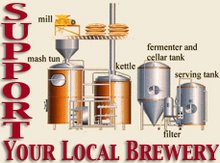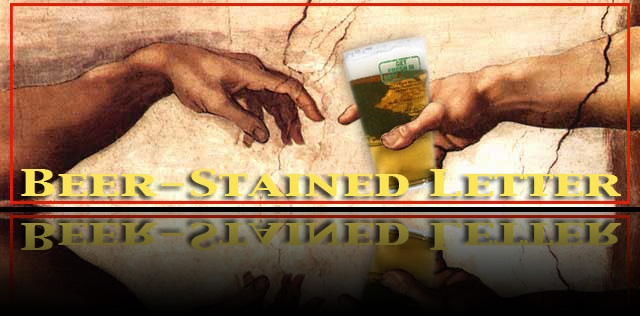Poor and stupid?
PubScout Kurt Epps gave us a heads-up on this one, the reason why liquor and wine were targeted for tax hikes in the next state budget, but not beer.
Kurt relayed some of a New Jersey 101.5 radio broadcast he heard, pointing out that the hosts said the state treasurer’s reason for beer being excepted was because beer drinkers are poor and stupid (to be clear: poor and stupid are the hosts’ words).
We haven’t listened to 101.5 since its former Jersey Guy jock Craig Carton picked a fight with Dick Codey by mocking the then-acting governor’s wife over her battles with depression. But as with a lot of talk radio, there is an anything-goes, rile-up-the-public style of discussion, even if it means being boorish. So yeah, poor and stupid. Wow.
But more realistically, The Press of Atlantic City did quote Treasurer David Rousseau in Thursday’s editions on the reason for no beer tax hike. Here’s the snippet (it's apparently from some media availability):
- “We wanted to protect what we believed was the middle-class and lower-income people's, you know …” He then stopped and said simply, “We'll leave it at that.”
We’re going to give the treasurer a little bit of a pass for what seems like a foot-in-mouth comment, that we as beer drinkers are wage slaves who live at the bottom rung and drink a cheap beverage as we go about our miserable existence at our miserable station in life. That’s really a complete dumb-ass thing for him to say, since a sixpack, or even a fourpack, of craft beer can run you over 10 bucks these days, depending on the style.
So we say to Mr. Rousseau, our esteemed treasurer: Man, are you out of touch. And we won’t leave it at that. Let us once again provide the link to Eric Asimov’s New York Times article from a couple years ago, that our beer ain’t the beer of the 1970s and ’80s college days, meant to be bought on the cheap and swilled like we’re a bunch of plebeian idiots with nothing else to do. Nope, it hasn’t been that way for well over 20 years nationally, and for a decade and half, New Jersey has been part of the craft beer movement.
But to be sure, by knocking his comments we’re not asking for our brewers to have to pony up higher taxes and decide whether consumers should share the pain in passed-on costs. Actually, we feel lucky. Truly. We had to deal with higher prices last year because of hops and grain shortages (the latter’s increase stemming from some ill-conceived, government emphasis put on corn as a biofuel. If Rousseau knew anything about beer, he could have said, “Beer drinkers already had to accept higher prices last year because of a spike in raw materials costs. Let's give them a pass.”).
So, we do, on many levels, appreciate the break on a beer tax hike – for now anyway, since a budget presented in March isn’t a budget passed in June. But if Trenton truly has a long-range plan in mind for digging New Jersey out of its financial quicksand (and judging by the repeated failures to put us on sound footing, there isn’t a plan, since the governor’s budget message seems to be the same year after year, as does the Legislature’s reaction), then lawmakers would make New Jersey more business friendly.
For brewers, that means a few things that we’ve been carping about in this election year, and learned from discussions with a few of our state’s taxpaying microbrewers. Chief among them is the fact that the state would collect more in excise and sales taxes if breweries were allowed the freedom to sell unlimited quantities retail (like wineries can) to people who stop by the breweries for tours. You could also toss in there the freedom to sell a couple of pints per person for on-site consumption during tours. Right now, as we’ve noted, the limit is two sixpacks or two growlers per person per visit, and small samples – only a couple of sips – are allowed to be served to visitors.
If brewers could sell more, then that’s more sales tax collected, more money in the state’s purse. The trickle-down effect is, when brewers sell more, they end up brewing more to meet demand, and therefore pay more in excise tax. It’s win-win. And before anyone wants to make the argument that breweries would be competing with retail outlets and against their own distributors, well no they wouldn’t. The breweries tend to be located in places that aren’t exactly shopping centers. So their foot traffic is far less. And they generally charge more per sixpack than liquor stores, and they really don’t want to become nightclubs (they just aren’t set up for that).
The point remains, however: Why deny the potential to collect more in sales and excise taxes (even if it's a modest amount), without having to raise either tax rate?
Modernizing the beer regulations means another thing: Letting brewpubs hold production brewer licenses, and production breweries hold pub licenses, so long as they meet local ordinances and get the blessings of their host towns (and have the capital to pull it off, since getting a consumption license is onerously expensive).
Brewpubs right now, as a lot of us know, can only make beer for on-site consumption, or for takeout. The beer must be purchased at the pub. You won't find it at a liquor store. It makes more sense to let them brew and sell to both their bar patrons and diners, and to distributors, who would sell it to their liquor store accounts, who then offer it at retail. It’s worth pointing out that some of the pubs are brewing below their capacity, because they can only sell to people who walk through their front doors. That’s lost revenue to those businesses and the state.
So we ask, why shouldn’t Basil T’s in Toms River be allowed to keg off beer, sell it to a middleman, who gets it on tap, for instance, at the Blue Claws stadium in Lakewood? Or let the Tun Tavern do likewise and have its beer sold on tap at the Atlantic City Surf’s stadium? There never seems to be a credible answer for why they can’t. The same goes for production breweries, no good answer why they can't hold pub licenses and get into the restaurant/tavern business with their product (it’s allowed in Pennsylvania, and seems to work just fine there.)
The state’s arcane and archaic rules continue to cost it revenue, sadly at a time when Gov. Corzine is sparring with state worker unions in a pick-your-poison debate over furloughs and layoffs (12 days unpaid furlough vs. cutting 7,000 jobs) and scrambling to come up with revenue to balance a budget that seems to grow more unbalanced as the economy tanks harder.
No one is so naïve to think that beer is the magic bullet here. But over the long haul, more beer brewed and sold means more revenue for the state. That's easy math. And fairer rules could translate to more brewers. And more revenue in taxes and fees.
And we’ll leave it at that.














1 comment:
Wow - those are some really good points. You should write an op-ed letter to the AP press. It'd be wonderful if the state's current economic woes could become a catalyst for some positive/revenue increasing changes.
Post a Comment